CD in deluxe box with pasted circular territory comes with a tete-beche handbound booklet, various inserts and extra’s. Limited to 75 numbered and signed copies.
Gaandeweg is about change, slow inevitable change.
This is Universaalkunst release MH17
Price: 32,50
Order directly by sending an email or order at Bandcamp
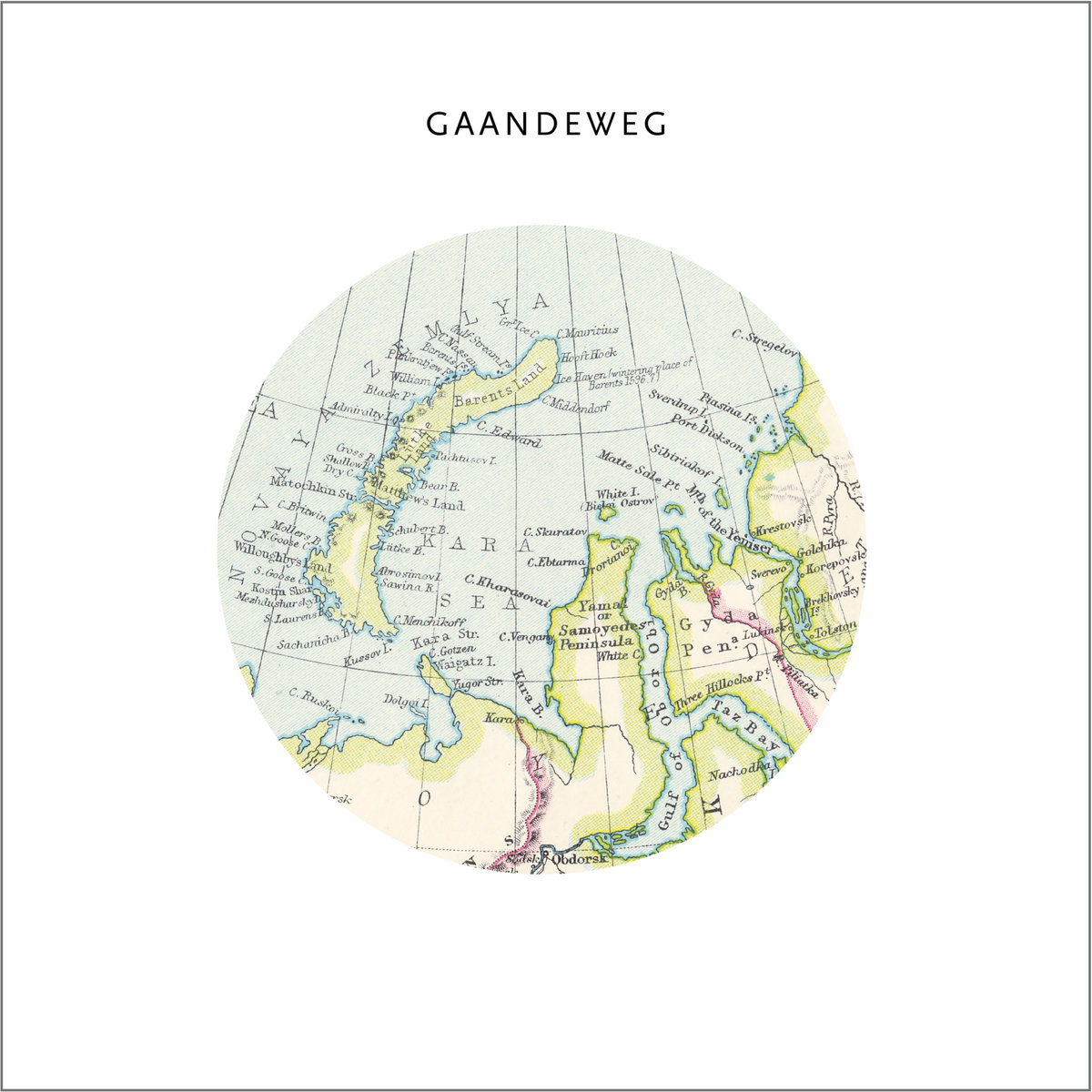
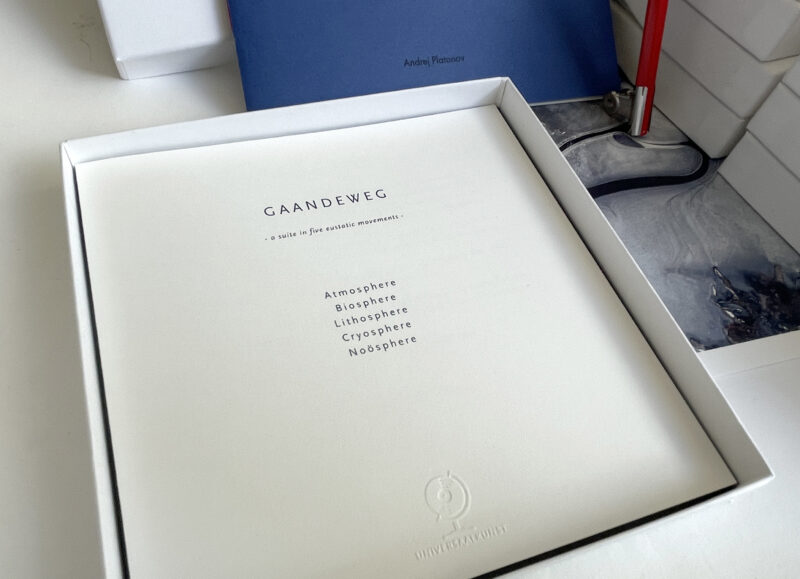
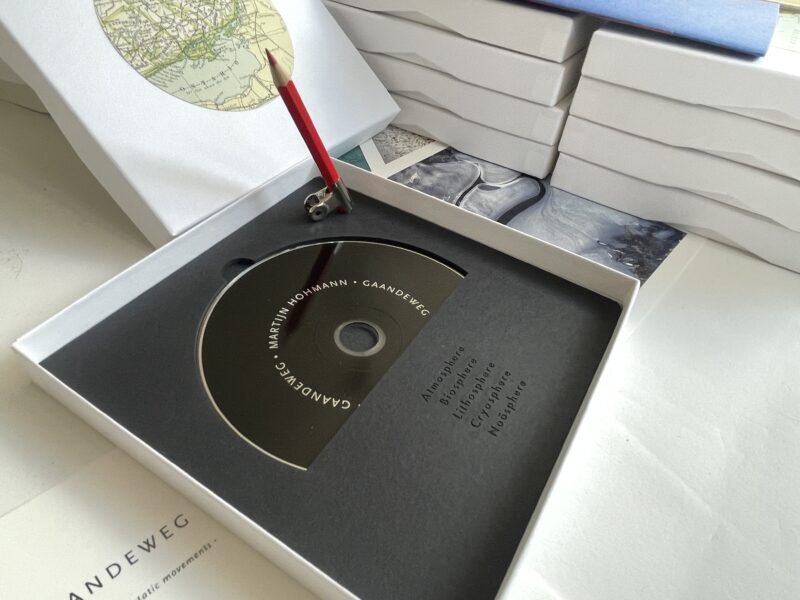
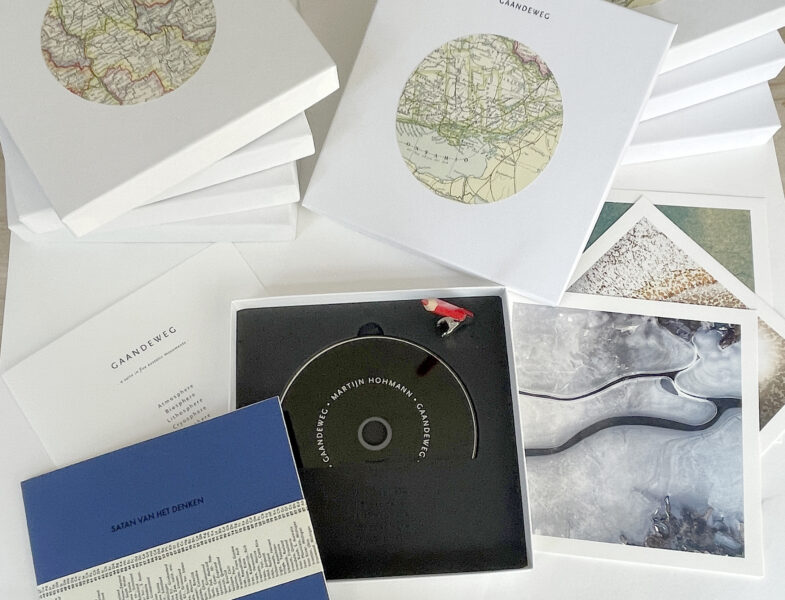
All copes are different, as are tastes, so you can claim your own territory.
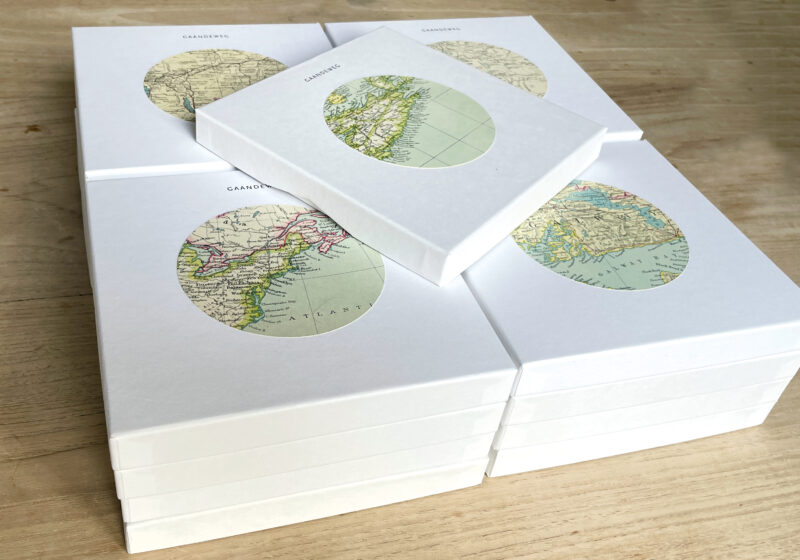
Review Gonzo Circus #182
Een audiovisuele totaalervaring: zo mogen we deze release van Universaalkunst wel omschrijven. De cd van ‘Gaandeweg’ van Martijn Hohmann zit verpakt in een doosje met als bijlagen onder andere een boekje met het kortverhaal (het Russisch origineel en een Nederlandse vertaling) ‘Satan van het denken’ van Andrej Platonov (1899-1951) en kunstzinnige kaarten, bij elkaar gehouden door een fragment uit het register van een atlas uit 1921 (het jaar waarin het verhaal voor het eerst werd uitgegeven). Een cirkelvormig uitgesneden fragment uit diezelfde atlas siert de hoes en maakt zo elk exemplaar uniek. Natuurlijk houdt dit alles met elkaar verband. Het verhaal van Platonov gaat over een geniale wetenschapper die met ultralicht het heelal wil redden door het te vernietigen, want de dood van zijn geliefde blijkt niet meer te repareren. Achter de visionaire klimaattheorieën schuilt dus een fataal liefdesverhaal. Hohmann geeft alles vorm middels vijf dreunende tracks met titels als ‘Litosphere’ of ‘Cryosphere’. In ‘Atmosphere’ maakt Richard van Dellen (De Fabriek) zijn opwachting met een gemanipuleerde trompet, wat het geheel even een vleugje Throbbing Gristle geeft. Tussen de gevarieerde drones, mixt Hohmann soft-synthesizers en heel wat veldopnames, zoals insectengeluiden, of een regenbui die uiteraard naar de klimaatverandering verwijst. ‘Gaandeweg’ is een bijzonder geslaagde en originele manier om ons aan het denken te zetten over het onomkeerbare. (pv)
Review Vital Weekly #1436
Some months ago, the Russian writer Andrej Platonov came up in a conversation with Martijn Hohman, telling me his next CD will contain a short story by him. He assumed I loved to read, which is true, but I hardly ever read fiction. I asked him to recommend some titles so I could find them in the digital domain (Platonov died in 1951, so surely there is something out there), but Hohmann had extra copies of a few books, and he mailed them to me. I am not a literary critic, but I admit I wasn’t blown away. Because the word science fiction was mentioned, I wrongly assumed these would be science fiction short stories in one book and a whole book. Instead, these were stories about living in the Soviet Union, about soldiers coming home, and some stories had an ending that I didn’t get at all, thinking, what’s the point here? The story inspiring the new CD wasn’t part of the collection, but Hohmann reprinted it in this otherwise lovely design carton CD box; by day, Hohmann is a designer, and that shows. ‘Gaandeweg’ means ‘along the way’, movement over time, and usually slow. Each piece is a sphere, so there’s ‘Atmosphere’ (with De Fabriek’s Richard van Dellen on trumpet, almost like on their first LP!), ‘Biosphere’, ‘Lithosphere’, ‘Cryosphere’ and ‘Noösphere’. In his music, Hohmann uses field recordings and soft synths. Some heavy drilling is happening in Vital Weekly Street this week, meaning my listening time is at different hours. For instance, on the lunch break, late afternoon, evening or early morning. The first time I heard ‘Gaandeweg’ was on the workmen’s lunch break, and I thought that perhaps Hohmann’s music was on a kind of sonic echo of the drilling. I’m not saying that his music is noise-based, far from it, but the drones and tones of his music are a residue of noise, a toned-down one if you want. Coupled with leaky pipes and other watery drops, his music has that dystopian feeling that I like so much in music. Hohmann’s music surely fits that whole posse of dark ambient composers working with grainy sound material. Usually, I’d add lo-fi and low-resolution samples, but for all I know, that’s not the case with Hohmann. His music has that arctic feeling; the ending of ‘Noösphere’ contains recordings of a highway, which sounds like a polar wind. He goes for slow movements and minimal changes in all five pieces, but the music constantly moves around. There is nothing static in the field recordings he uses. At which point I returned to the Platonov story. In the box, we find objects, prints and the story in Dutch and Russian (English is provided in the download via an AI-generated translation). The story is called ‘Satan Of Thought’ and, if understood correctly, is about an engineer who wants to restructure the earth, to make it all function better and then moves on doing the same thing for the universe, but all because of a lost love. Again, if I understood correctly. If I am thinking about the music, I hear some of that dystopian thing in there, but in Hohmann’s music, there is also a shimmer of hope. It is an exciting project of which I may not understand the depth of it all. (FdW)
